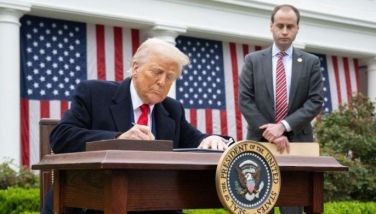Forget BRICs. Think TIP

I heard about this hot new book about the countries investors should watch out for. So off I went to Fully Booked at Rockwell last Sunday afternoon but they were sold out… in all branches and they don’t know when they will have it again.
Just as I was walking out of the book store, I caught a glimpse of P-Noy with his kabarkada at the far end of the book store’s coffee shop. Could it be that he bought all the available copies of the book? After all, the book’s high hopes of our bright future were sparked by the excitement generated by P-Noy’s aura of honesty and good governance.
Breakout Nations: In pursuit of the next economic miracles is about an exciting new group of up and coming countries. Forget the BRICs. It is now all about TIP. BRIC is of course Brazil, Russia, India, China. TIP is about Turkey, Indonesia and believe it or not, Philippines… the Breakout Nations.
Ruchir Sharma, the head of Morgan Stanley’s Emerging Markets wrote the book and it had received enthusiastic reviews from the leading economic and financial publications. I caught his interview by an editor of The Economist on You Tube. It is easy to see why the book became an instant hit in circles trying to figure out where the world of business is going to in these turbulent times.
BRICs, he says, are so yesterday. He doesn’t think the past necessarily determines the future. Take the decade of rapid growth for the world’s most celebrated emerging markets. “Rapid growth can’t be sustained and it’s time to look to the next decade’s big growers for big returns.” Sharma thinks investors should take a look at the “Breakout Nations,” which includes the Philippines, as “the next big bets.”
Sharma describes two broad forces that drove emerging markets’ growth during the last decade. The first was high commodity prices. The second was a flood of “easy money” in the form of very low interest rates in the US and the Eurozone. Low interest rates in the West stimulated domestic consumption, which fueled demand for exports from emerging markets, which in turn demanded more commodities. Now these forces are running out of steam, Sharma points out.
The New York-based banker travels the world in search of signs that would point him to the exciting economies of the future. Investors, he says, must be quick to see the signs because once these countries get on the radar screens, it is too late.
Mr. Sharma, defines a “Breakout Nation” as: a country that is able to beat expectations in terms of growth rate; and a country that’s able to grow faster than other countries in the same income class per capita income. So I asked him if we got into his list of “Breakout Nations” only because expectations are so low we can’t help but beat them. He said yes, precisely so.
He told me he noticed when he visited the Philippines two years ago that the level of frustration is so high. He thinks that’s good because reforms happen when people’s backs are to the wall. But, I protested, our backs have been to the wall for four decades now… what makes it different this time? Well, he said he senses “a good contrarian charm” with the Philippines.
And you know what, he thinks P-Noy’s focus on good governance and fighting corruption is just the right start. But before administration apologists call Amazon.com to order a container full of this Wall Street guru’s book, Sharma emphasized that we still need to focus on economic reforms and maintain political stability.
So we can’t just talk about our greatness. P-Noy’s economic managers will still have to work long hours and get those expressways and modern airports up faster or this country isn’t going to break out. According to Sharma, our so called favorable demographics mean nothing unless we do something positive about it – like educating them to be productive participants in the economy.
Yes, inclusion is important too, Sharma told me. We cannot just ride on OFW remittances and Call Centers. As an ADB paper pointed out, these two engines can’t carry the rest of the workforce that’s not as educated and trained coming from the agricultural sector. Resurrecting our manufacturing sector is a good idea.
Sharma criticized Brazil and to some extent India for becoming “premature welfare states” and so I asked him what he thought of our Conditional Cash Transfer program. He said in our case, government expenditures are still manageable and the CCT may help get marginalized sectors into the mainstream of our economy.
Then there is our entrenched oligarchy. Sharma thinks we need to rid ourselves of our traditional rent-seeking elite. And this requires political will. Does P-Noy have the political will to make the tough decisions against his social class? Political will is one of those things that would make us a true Breakout Nation, Sharma suggests.
Take Turkey for example. Sharma thinks Turkey has the potential because it has successfully created industry outside of the Ankara-Istanbul-Izmir corridor, suggesting state capacity of a high order. “Some states get inclusion just right: to create a productive workforce that can participate in the modern economy. Others like Brazil, South Africa and potentially India get a ‘premature welfare state’ where welfare commitments don’t empower, but cause a fiscal drag.”
It is interesting how Sharma selects his Breakout Nations. He does not rely on routine numbers — the gross domestic product, its growth and composition; consumption and investment rates; infrastructure; political and economic policies; education and employment; welfare schemes.
Sharma also looks on such things as a country’s “top-10 billionaire lists, the speeches of radical politicians, the prices of black-market money changers, the travel habits of local businessmen (for example, whether they are moving money home or off-shore), the profit margins of big monopolies, and the size of the second cities”, as the author states in the book’s introduction. He also finds clues in the tariffs of Four Seasons hotels in various countries, nightclubs of Istanbul, and soap operas on Korean television.
Sharma doesn’t have a magic formula to be a Breakout Nation. He has the long familiar list: the free-market flow of goods, money, and people; encourage savings... impose the rule of law... stabilize the economy with low budget and trade deficits; keep inflation in check; open doors to foreign capital, particularly when the capital comes in with technology... build better roads and schools; feed the children.” In other words, P-Noy, no short cuts!
It is interesting to note that most of the reviews of his book focused on the other Breakout Nations in Sharma’s list and all ignored the Philippines. But Sharma keeps mentioning the Philippines in his interviews as his prime example.
He told me he took in mind that we used to be the 2nd richest economy in Asia in the 1960’s but had the misfortune of bad political leadership and the economy lost its way. He sees change at the margin that promises something.
Much as I can see Sharma’s point and would love to share his optimism about our country, I have seen too many aborted economic take-offs to prematurely celebrate. For one thing, bad political leaders are still in our midst.
Specificially on the economy, I agree with the view expressed by Noel Reyes, (a former research head of Business World and one of the better business reporters of his time who worked under Raul Locsin) that only after we jettison our antediluvian economic structure and free our economy can it really fly.
I share Noel’s frustration over how our “so-called industrialists continue to live in the mercantilist era, refusing to open up the economy to foreign competition. With their control of the legislature, either through direct representation or through a well-oiled lobby, the country’s trade barriers are in no danger of crumbling.”
Thank you, Mr. Sharma, for considering the Philippine in your list of Breakout Nations. Your faith in us is inspiring. We need to see what you see in us. Maybe it’s your ability to compare nations and their economies from your Wall Street perch… or your extensive travels that give you the perspective none of us have.
Mr. Sharma makes a living by being alert to emerging trends before they become obvious. He certainly must know something we don’t.
What we do know is that we cannot trust our government to carry out reforms because it is captive to the entrenched interests who are happy enough with things as they are. I sure hope we end up a Breakout Nation but I can’t keep my hopes too high.
Economic future
Someone once said: Economic forecasting is like trying to drive a car blindfolded and following directions given by a person who is looking out of the back window.
Boo Chanco’s e-mail address is bchanco@gmail.com. Follow him on Twitter @boochanco
- Latest
- Trending

























